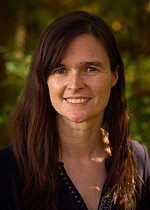In the past few decades, wildfire activity has increased in the western United States and Canada, and can be attributed, at least in part, to a changing climate. The air pollution from wildfires has been associated with increased risk of exacerbations of respiratory disease, specifically asthma and chronic obstructive pulmonary disease, but also with some cardiovascular health endpoints, and mortality. Dr. Colleen Reid, assistant professor in Geography at the University of Colorado, Boulder, provided an overview of what is known and not known about the health impacts of exposure to smoke from wildfires.
In the summer of 2014, the Northwest Territories (Canada) experienced a severe wildfire season with prolonged smoke events and poor air quality. Dr. Warren Dodd, Assistant Professor in the School of Public Health and Health Systems at the University of Waterloo, Canada, discussed his team's qualitative study that explored how this wildfire season affected mental and physical health in addition to livelihoods of residents in four communities. Dr. Dodd also shared the perspectives of interviewees concerning adaptation and policy recommendations for future extended wildfire seasons and smoke events.
Featured Speakers
 Colleen Reid, PhD, is an assistant professor in Geography at the University of Colorado, Boulder. Her research focuses on the interaction of environmental and social exposures on population health with a particular focus on the health impacts of exposures influenced by global climatic changes and society’s responses to those changes. Specifically, she has led research projects on the health impacts of the 2008 northern California wildfires, and the creation and evaluation of a national neighborhood-level map of vulnerability to extreme heat events. Trained in environmental epidemiology and spatial exposure assessment at the University of California, Berkeley, her post-doctoral training was in social epidemiology as a Robert Wood Johnson Foundation Health and Society Scholar at Harvard University.
Colleen Reid, PhD, is an assistant professor in Geography at the University of Colorado, Boulder. Her research focuses on the interaction of environmental and social exposures on population health with a particular focus on the health impacts of exposures influenced by global climatic changes and society’s responses to those changes. Specifically, she has led research projects on the health impacts of the 2008 northern California wildfires, and the creation and evaluation of a national neighborhood-level map of vulnerability to extreme heat events. Trained in environmental epidemiology and spatial exposure assessment at the University of California, Berkeley, her post-doctoral training was in social epidemiology as a Robert Wood Johnson Foundation Health and Society Scholar at Harvard University.
 Warren Dodd, PhD, is an Assistant Professor in the School of Public Health and Health Systems at the University of Waterloo, Canada. His research aims to understand and address the social and ecological determinants of global health and development. In particular, he is interested in how factors such as poverty, migration, food security, and climate change interact and shape health outcomes. He conducts research in close collaboration with community partners and organizations with the goal of co-producing information to support decision-making and action. Regionally, he has worked and conducted research in Honduras, India, the Philippines, and Canada.
Warren Dodd, PhD, is an Assistant Professor in the School of Public Health and Health Systems at the University of Waterloo, Canada. His research aims to understand and address the social and ecological determinants of global health and development. In particular, he is interested in how factors such as poverty, migration, food security, and climate change interact and shape health outcomes. He conducts research in close collaboration with community partners and organizations with the goal of co-producing information to support decision-making and action. Regionally, he has worked and conducted research in Honduras, India, the Philippines, and Canada.
Warren earned his PhD in Epidemiology and International Development Studies at the University of Guelph (Canada) in 2016 and completed post-doctoral training at the University of Toronto in 2018 funded by the Canadian Institutes of Health Research.
This webinar was moderated by Sharyle Patton, director of the Commonweal Biomonitoring Resource Center. It lasted for 45 minutes and was recorded for the call and webinar archive.
